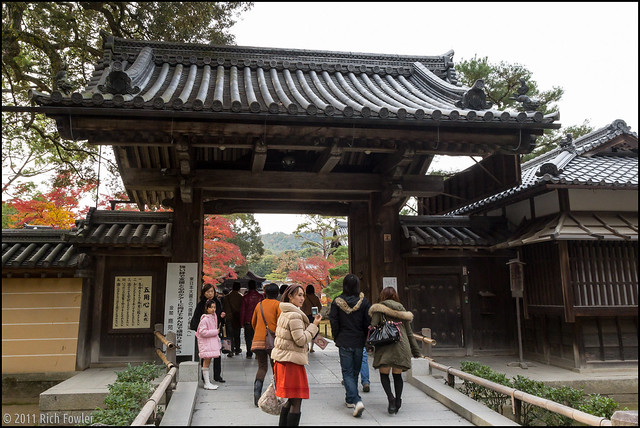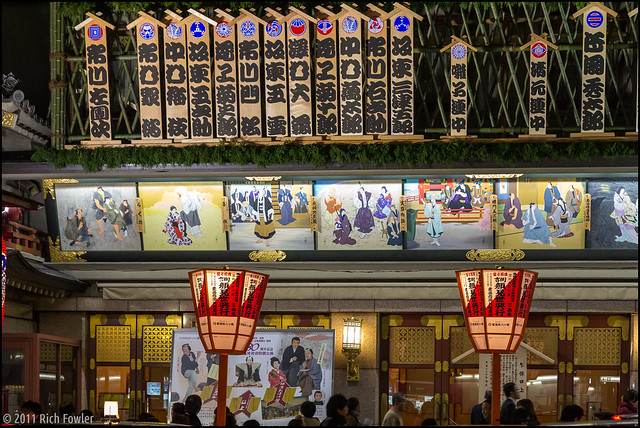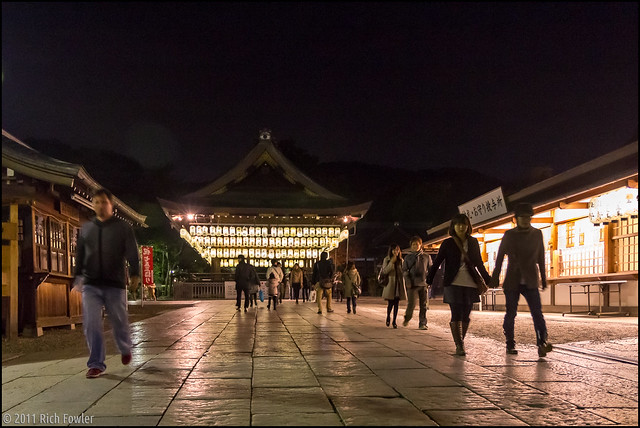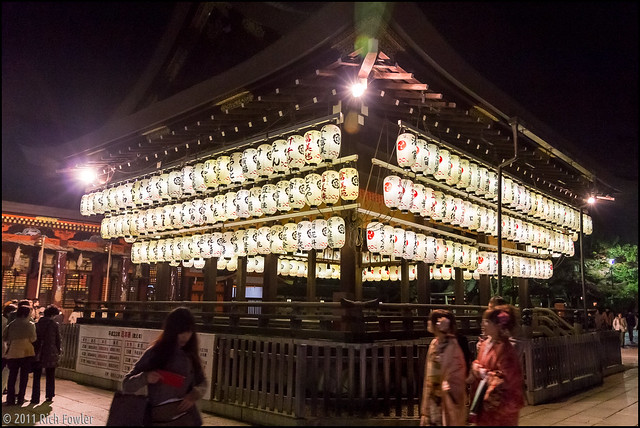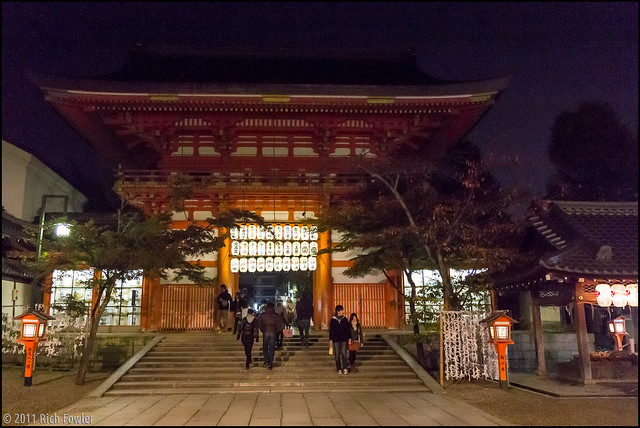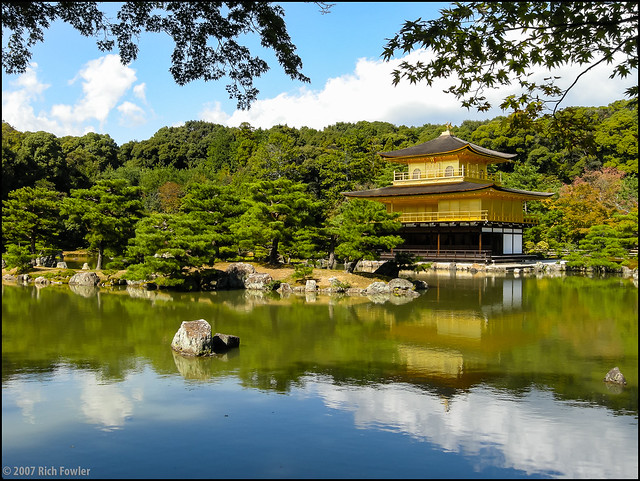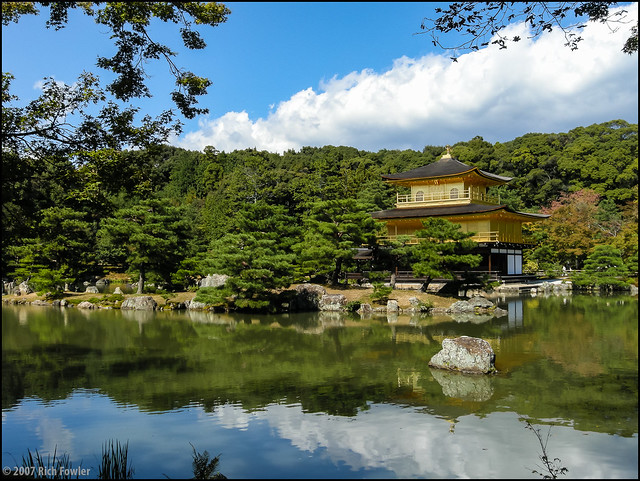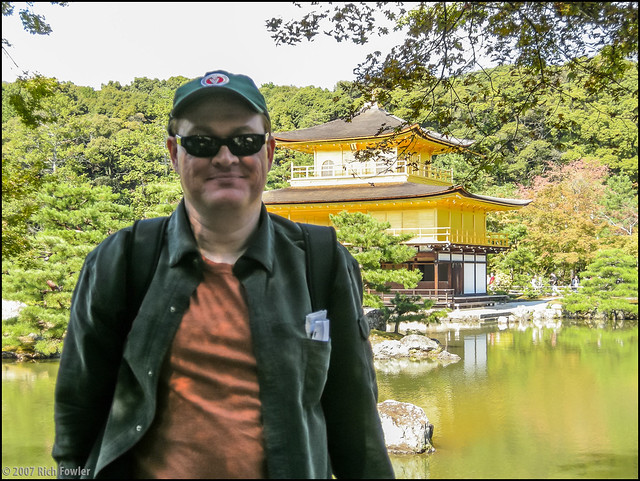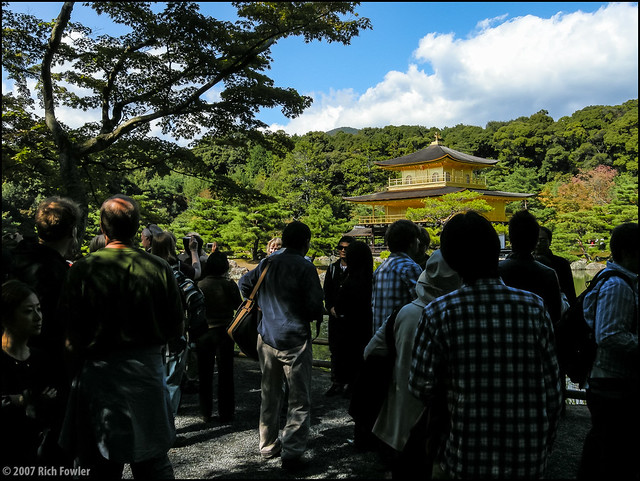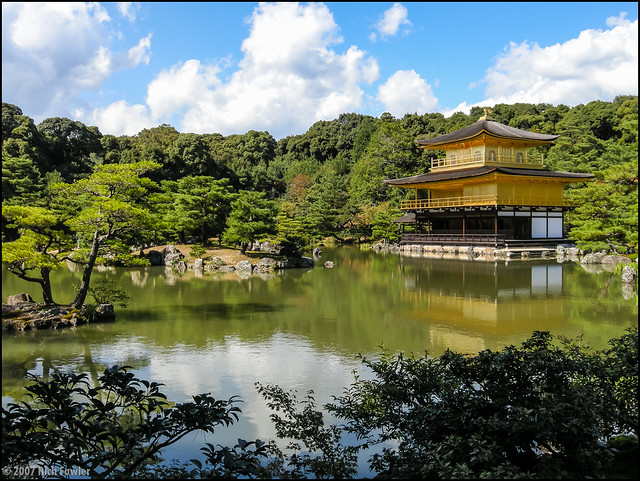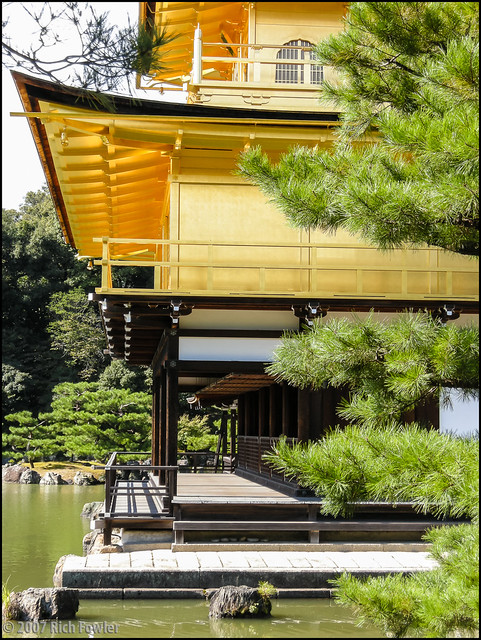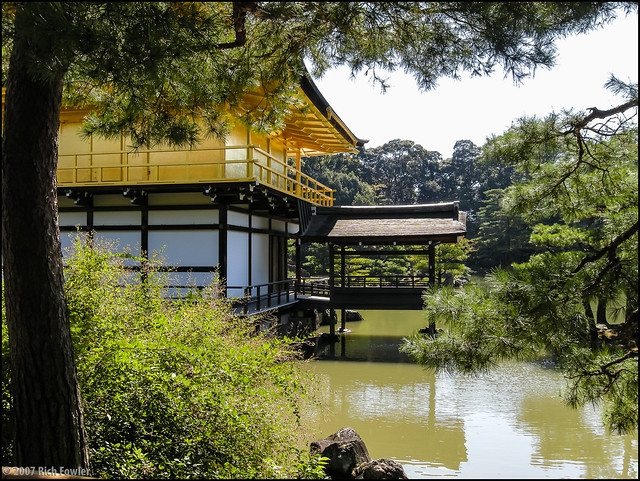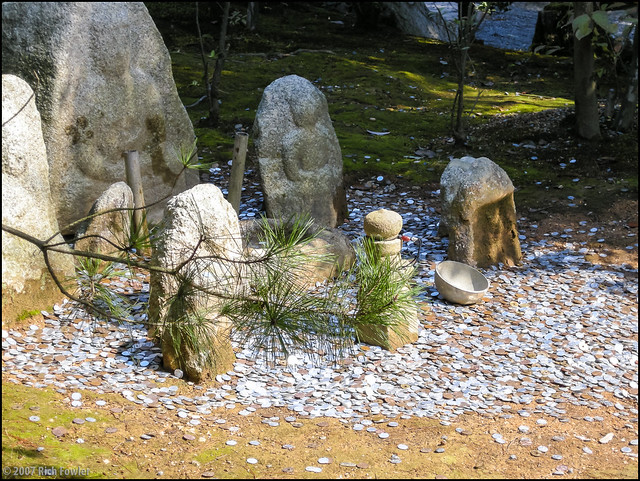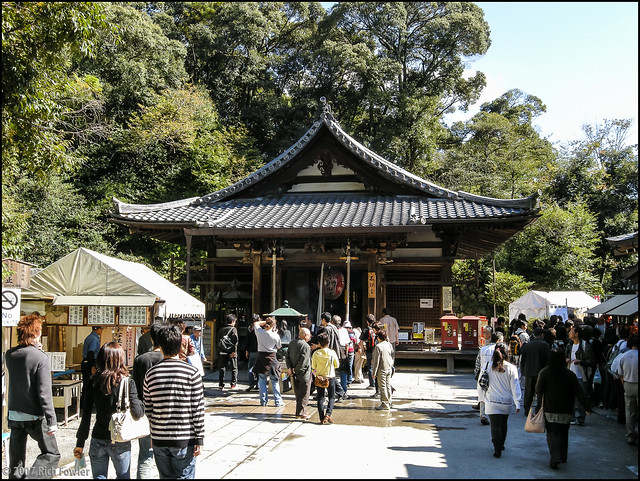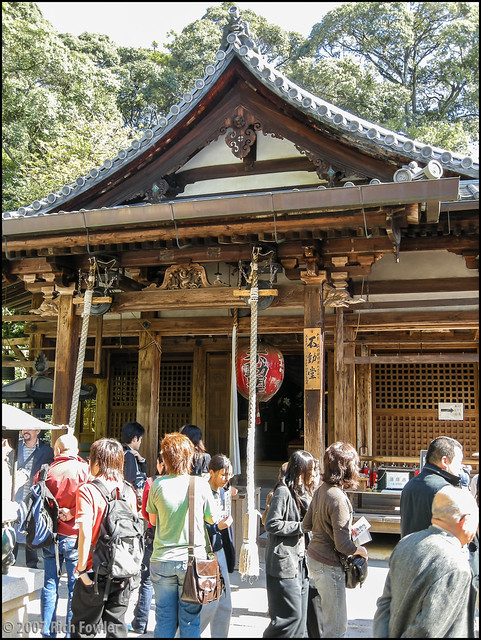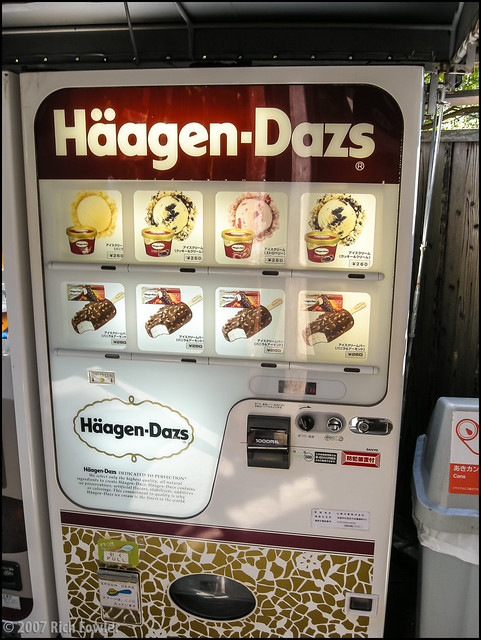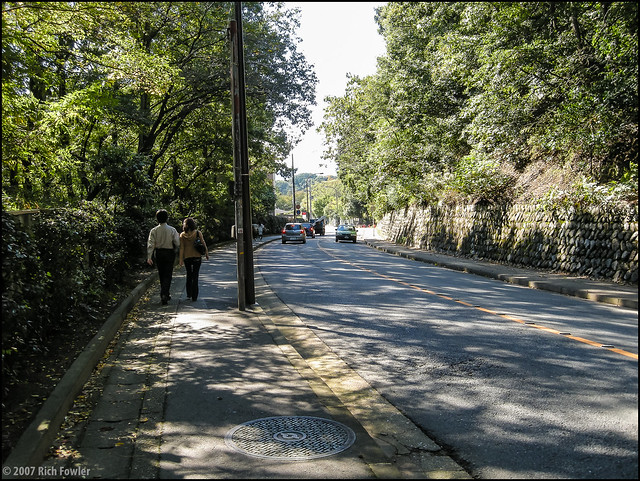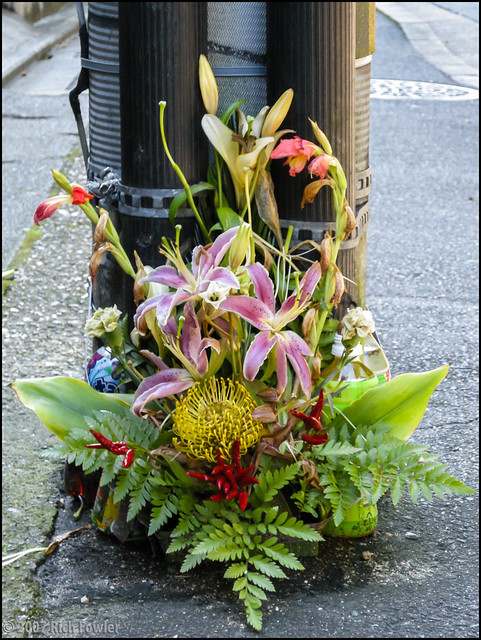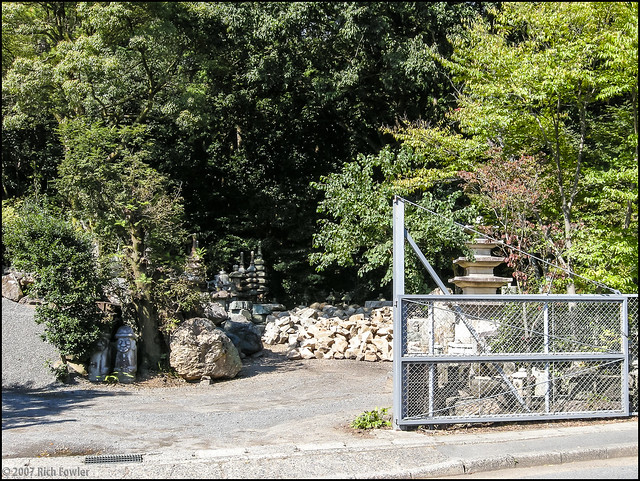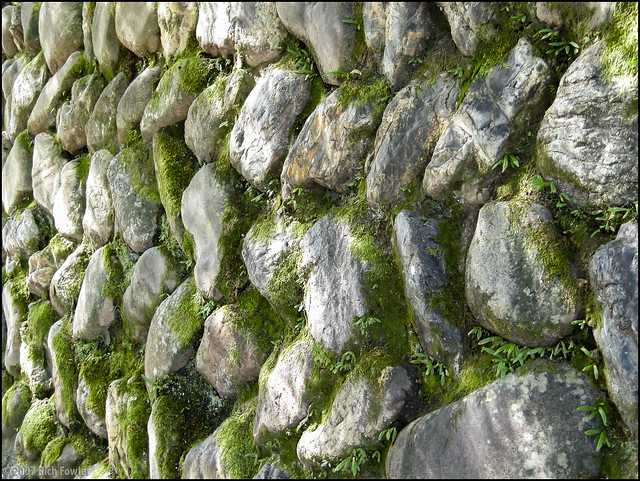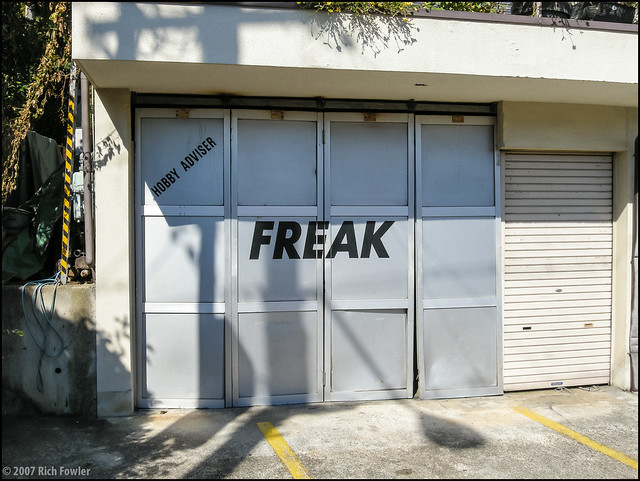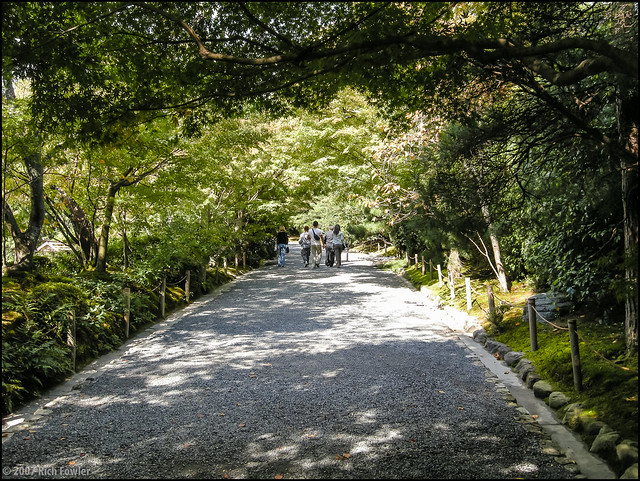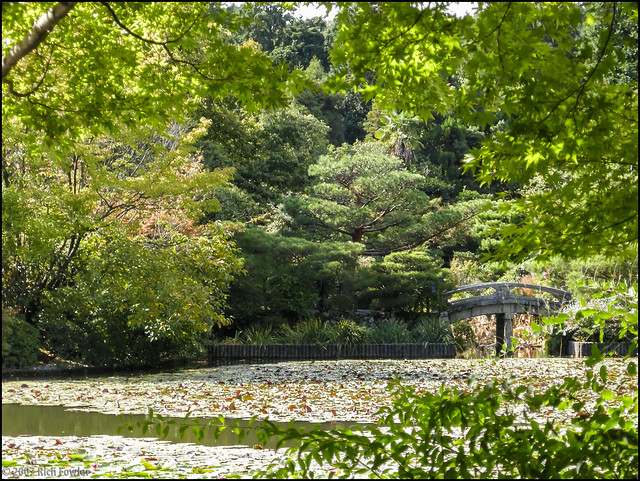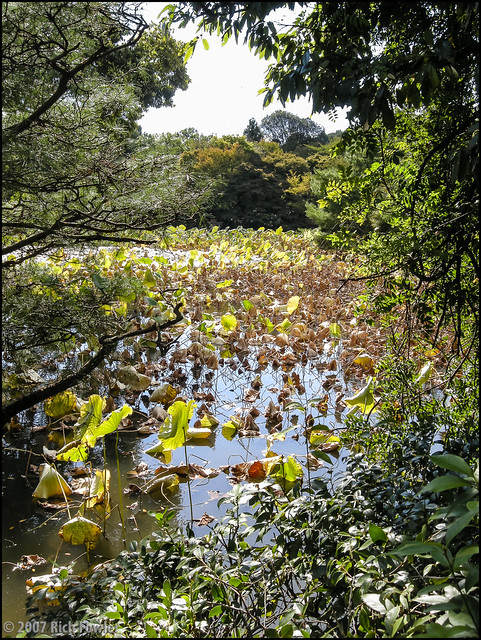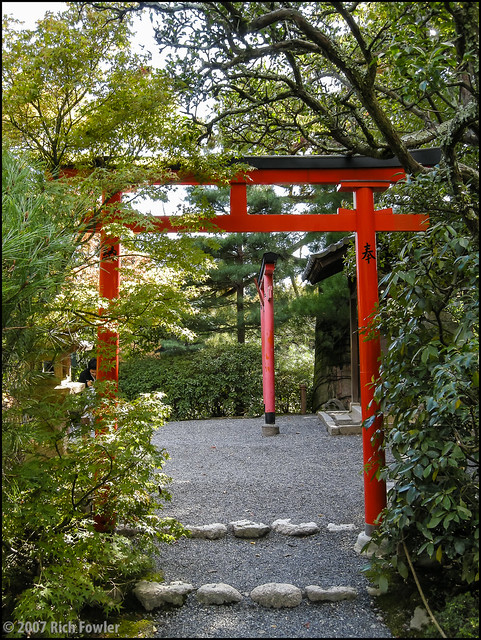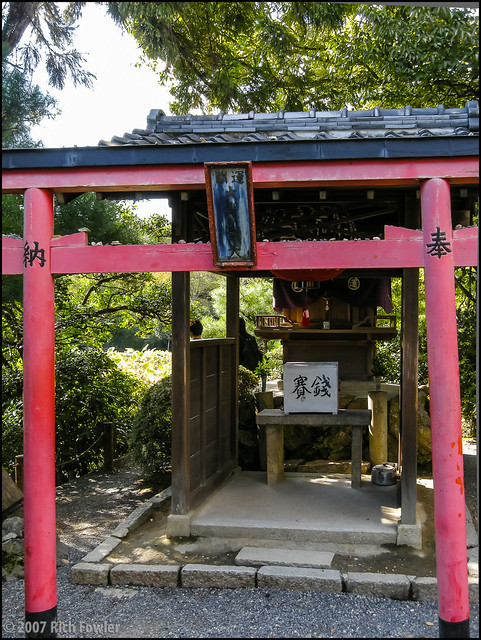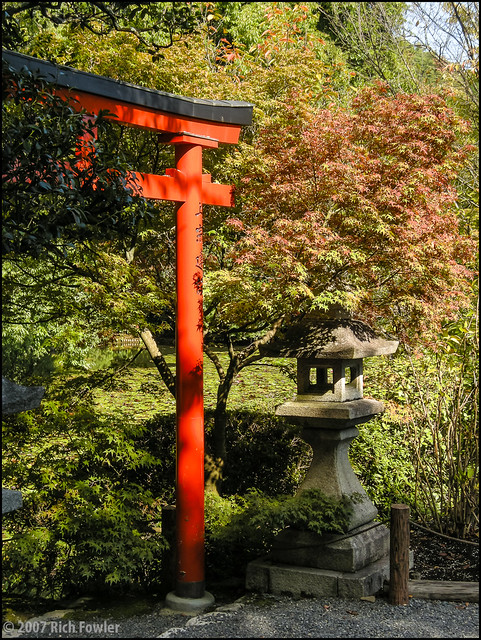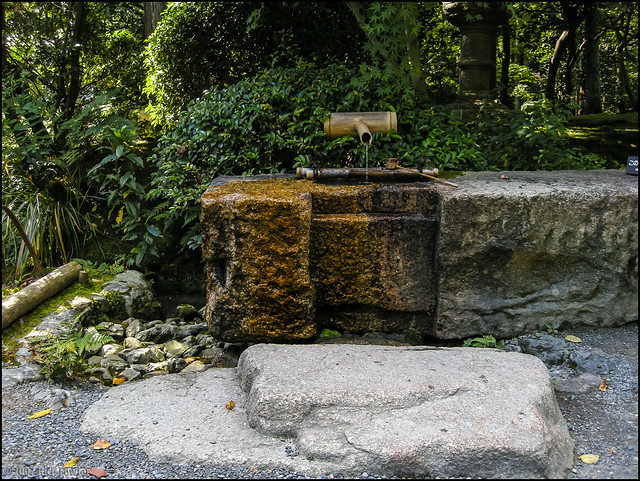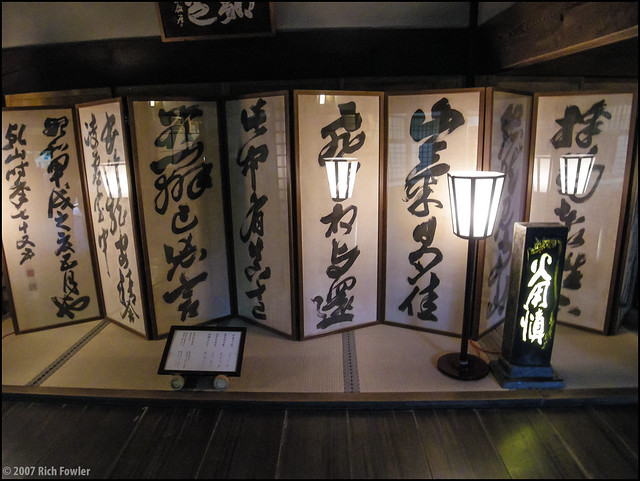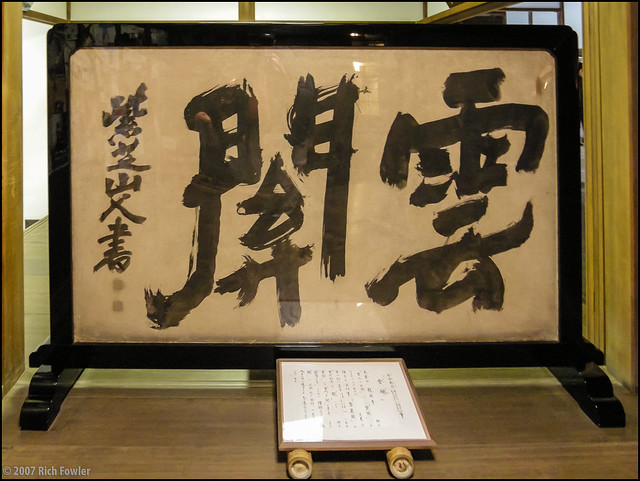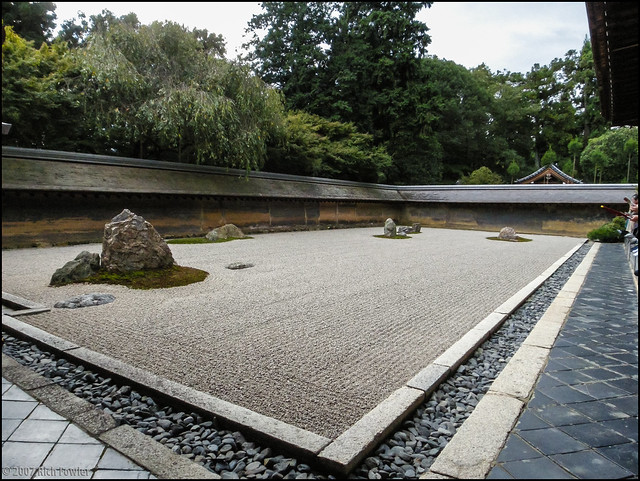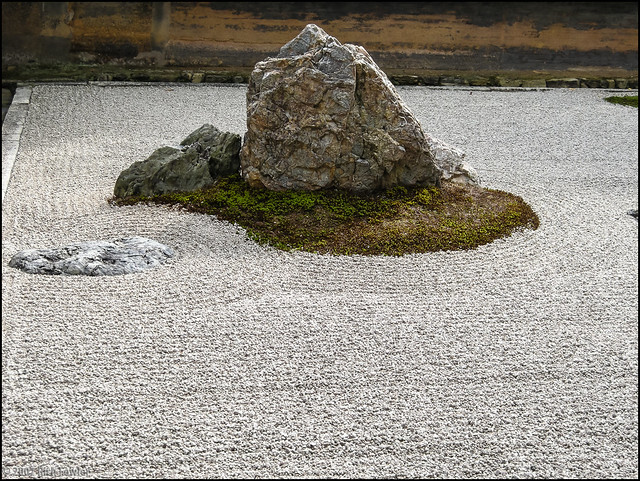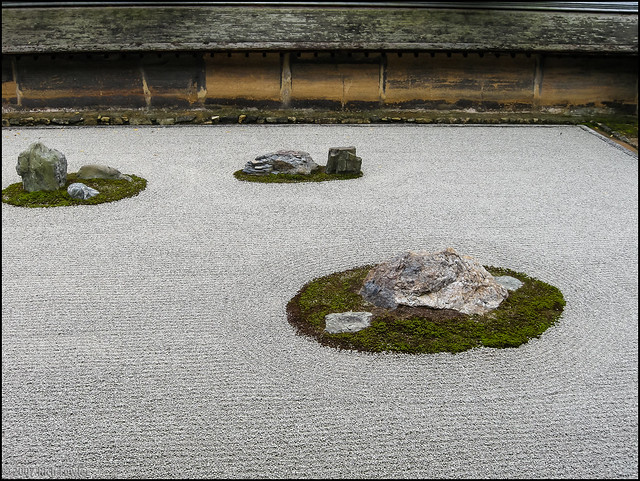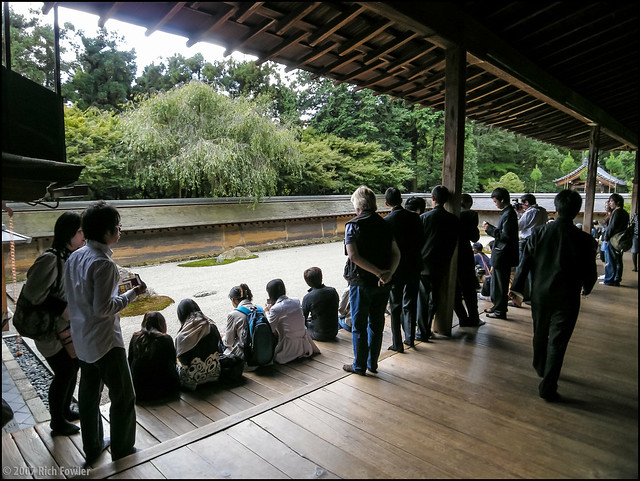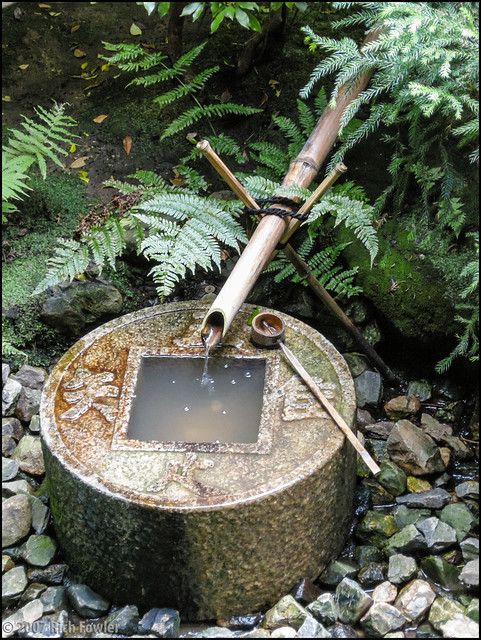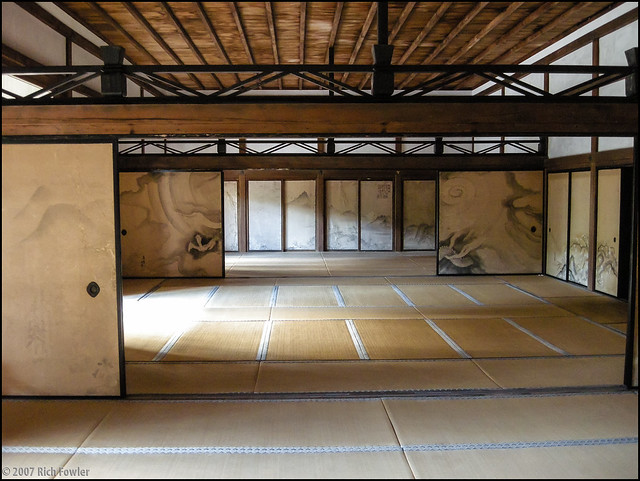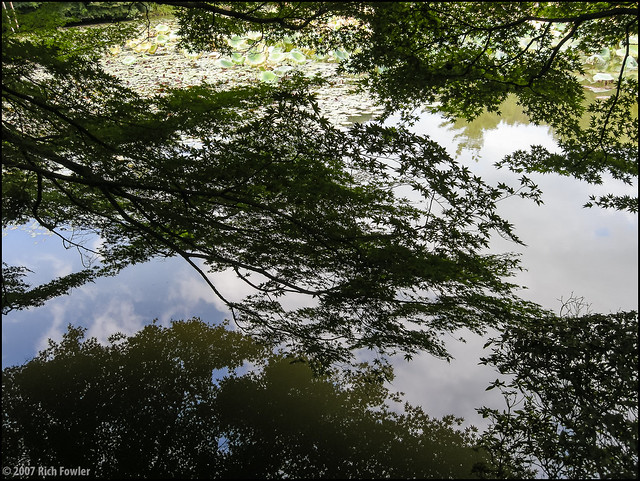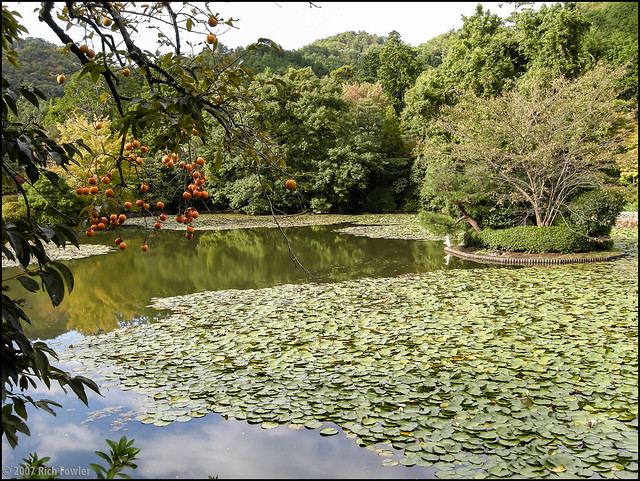It was an interesting bus ride to Kinkakuji, since I had to stand the whole trip. It was kind of like surfing on a whale in choppy seas. A very crowded whale.
I saw a group of American guys on bicycles doing some kind of tour of Kyoto while I was waiting for the bus. It looked like something that would be fun in the off-peak season, whenever that is.
By the time I got to Kinkakuji by bus, I stopped off at a place full of benches outside of the temple to take a short rest break, because I had been on my feet for most of the day so far, and I saw the guys on bicycles come riding in. So the bus was faster this time, but I’m sure bicycling in Kyoto has its own charms.
Right outside of the temple grounds, there’s a good view of one of the big characters they light on fire on the top of one of the nearby mountains.
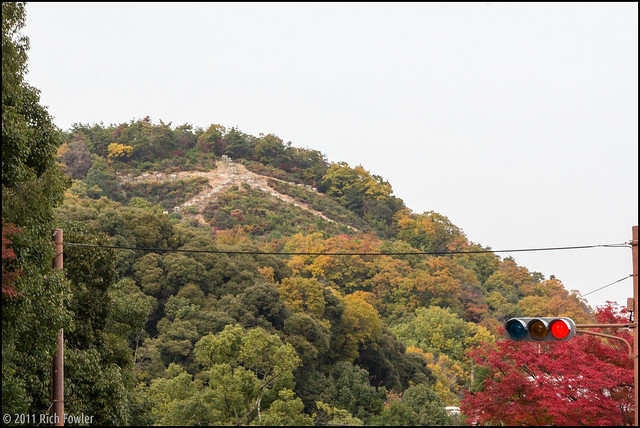
It’s Still Made of Gold, and Tourists!
Visiting Kinkakuji is always a bit of a stuggle. It’s a struggle to get there, and when I get there, it’s a struggle for a good spot with a good view for a good shot. Sometimes it feels like too much work.
Coming in, even though the sky was gray, the leaves added some nice color. And there were some big crowds there, too!
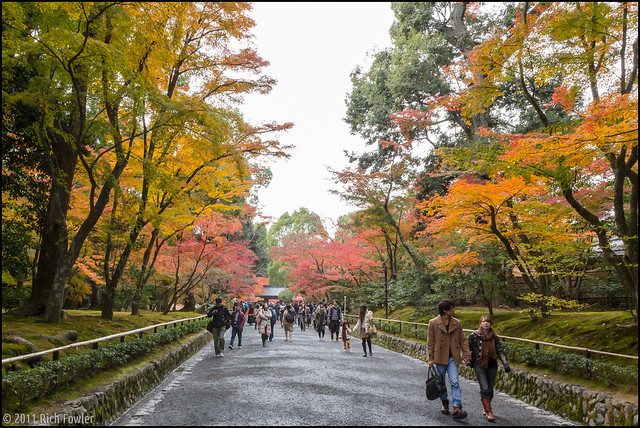
Getting closer to the entrance:

The map of the temple grounds:
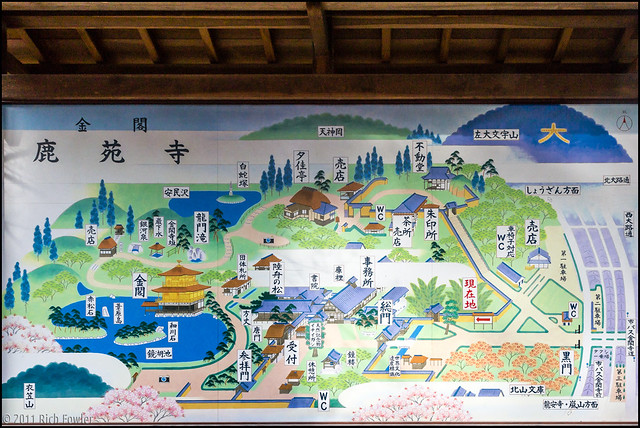
For 200 yen, you can ring the bell!
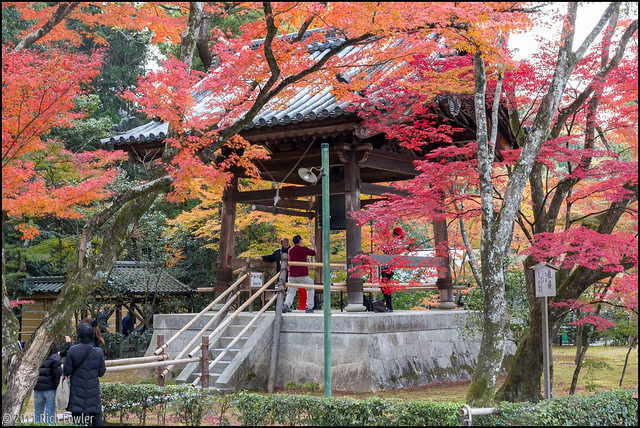
I got there, and it was gold, pretty, and full of pretty red leaves. So naturally the crowds were amazingly packed in. (I think it was also in one of those popular magazines, but it’s Kinkakuji anyway. It’s one of the most famous buildings in Japan.)
But it was beautiful, in the only way a golden building sitting in the middle of lake can be.
Don’t believe me? Have a look!
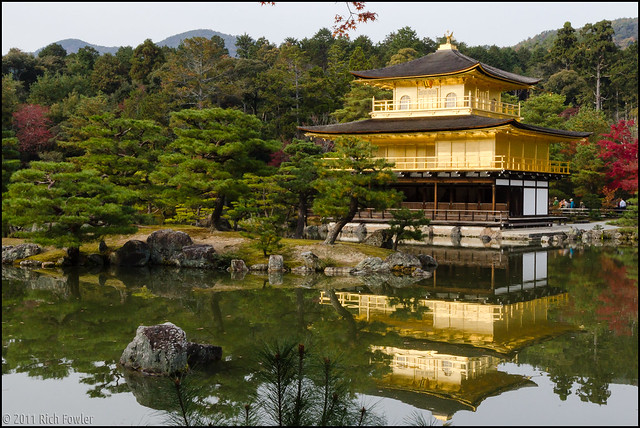
I like this shot with extra Japanese Maple leaves in it:
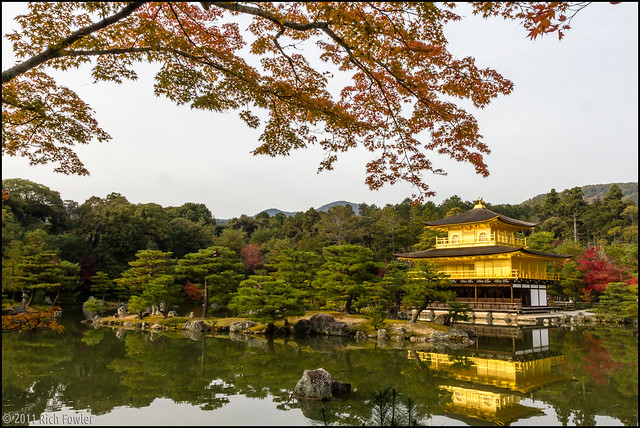
Detail of the phoenix on the roof:
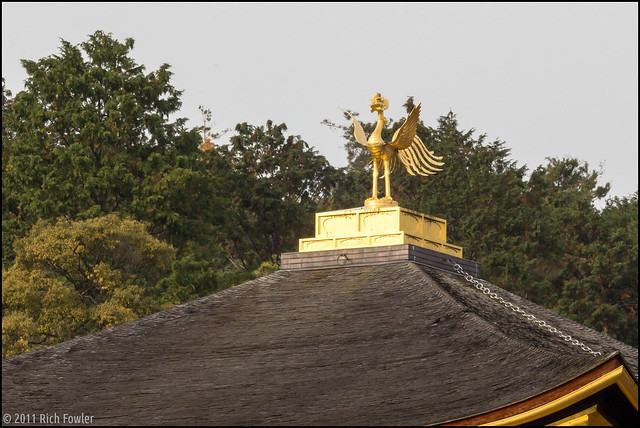
A close-up shot of the side of the pavilion.

And everyone is lined up to take a 記念写真 (ããã‚“ã—ゃã—ã‚“ kinenshashin) or souvenir photograph.

On the way out, I got an omikuji, which is a slip of paper with a fortune on it you can buy at temples and shrines in Japan. I got a å‰ ãã¡ kichi, which means “good luck” fortune. This was a good omen.
Kyoto is sometimes a mess, and it’s often a battle with frustration, but it can be an incredible experience if you’re willing to put up with the little annoyances. Just understand that that’s the nature of the city. It’s the traditional cultural center of Japan, so you’re not just going up against foreign tourists, who were pretty thin on the ground here this time, but you’re really going up against large crowds of mostly Japanese tourists.
I Don’t Think We’re in Freeport Anymore
Done with Kinkakuji, I grabbed a cab to Kita Oji station, figuring that a cab all the way to Kiyomizu temple would be insanely expensive.
I got to the station (cost: 1,050 yen for ~ 1 mile), and what do I see?
An L.L. Bean store! YES! Score! Thanks å‰! I owe you one!
Why am I excited about seeing an L.L. Bean store when I could instead be looking at some more temples and shrines and getting more cultured?
I’ll tell you.
I’ve been freezing my tail off for the last 4 weeks or so, mainly because I can’t find clothes that fit me. I wear an XL in US sizes. An XL in Japanese sizes is closer to a skinny L or a fat M in US sizes. A US XL is more like a fat XXL or a skinny XXXL. Good luck with finding that at 99% of clothing stores here. I can’t find any clothes that fit me in the Japanese stores around Okazaki. Even the North Face store in Nagoya was a bust.
And it’s not like I’m particularly big for an American guy. I’m pretty average, but I have a big chest and big shoulders, so I’m kind of screwed.
I decided to check out the L.L. Bean store, and they still had about half of their men’s clothes in US sizes. (Oh, thank GOD!)
Sadly, they were converting a lot of their wardrobe to Japanese sizes. Don’t even bother to try to buy shoes there if your shoe size is over 10 (US) — you’re out of luck. Not that I needed shoes, but it’s a useful thing to know.
I found a plaid polartec button-down shirt, a sweatshirt, and a polartec hat. Woot! But now I had another problem. I had a bag full of bulky clothes to carry around with me, and that simply would not do.
Omiage Means “Thinking of You, and How to Fulfill My Societal Obligations to You”
I headed back to Kyoto Station, in search of another locker.
When I got there, I remembered something important: I needed to buy ãŠåœŸç”£ã€€ãŠã¿ã‚„ã’ omiyage (souvenirs) for my fellow classmates and teachers. It’s just what you do here, and the students at Yamasa, even though they are from all over the world, have all picked up on this tradition.
So what should I buy for classmates and teachers? Well, it turns out that there are whole shops in the train stations devoted to providing the best omiyage to meet every conceivable social obligation.
I went to the store near the escalators and found some lovely rice crackers with a fall leaf design painted on them with some kind of edible frosting, I think. So I bought a box of 20 individually wrapped rice crackers for about 2,000 yen, and I was done.
Yep, I was done. I’ll give everyone a cracker on Monday, and they’ll be pleased. It’s not the present, it’s the fact that you went to the trouble to get people a little something. Of course, with other kinds of gift-giving, you have to put a lot more thought into it, because gift-giving here can be a minefield. But that’s not an issue today.
Food makes the best omiyage, because people can eat it and not worry about it taking up space. Space here comes at a premium.
Then I dumped everything in a locker, and checked the Shinkansen departures board for trains to Nagoya. They were starting to fill up fast. I got in line at the ticket office, and got a ticket on the 8:52 pm Hikari bound for Nagoya (and Tokyo, but I don’t care about Tokyo now.)
My only mistake was getting a window seat. Otherwise, it was brilliant to get my ticket now.
Goin’ to Gion
I used Wikitravel on my Nexus One to find a place to eat. I found a yakitori chain popular in Kyoto, and went to their Gion branch. It took a while to find it, because it wasn’t at street level– it was on the 5th floor of a nondescript building. Dinner on a stick was great. I had yakitori, yakiniku, a salad, and onion rings all for 1400 yen. Not bad. That was really my first full meal of the day, because I had been running around so much before.
After that, I headed to Gion to do some sightseeing. Gion is famous for expensive restaurants and geisha, among other things. It’s also famous for tourists and the shops that cater to them. It’s a lively and fun area. I stopped at a few shops here and there.
As soon as I crossed the bridge, I spotted the Minami-za Kabuki Theater, so of course I took some photos:

The main road (Shijo Dori) through Gion goes for about half a kilometer or so, then ends at a shrine, Yasaka Jinja. Here’s a shot of the road from the front steps of the shrine.
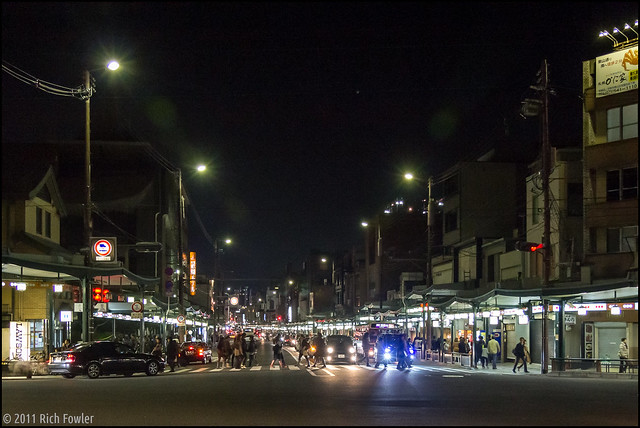
When I got to the shrine, all of the lanterns were lit up for the evening, so it looked really pretty. I took some photos, of course.
One of the many lanterns at the shrine:

Artsy shot as I get closer to the stage:

A few shots of the lanterns surrounding the stage:

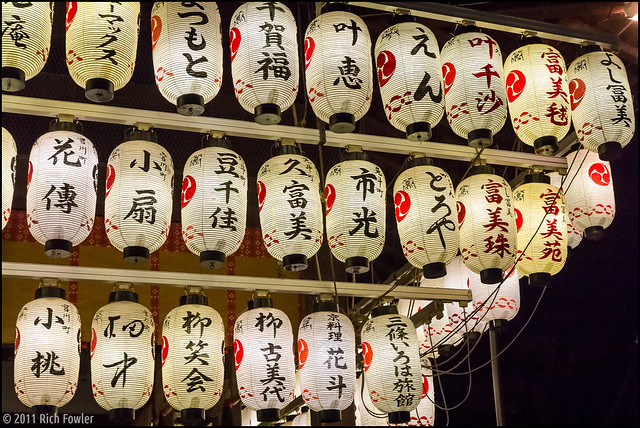
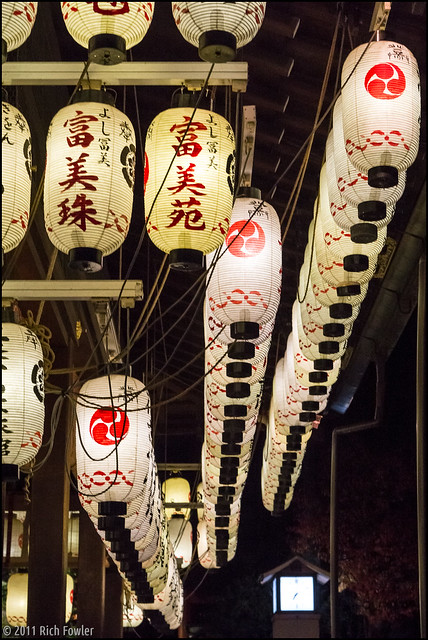
At this point, my Canon 60D’s battery crapped out, and I switched to the tiny little Canon IXY I kept in my pocket.
Another couple of shots of the stage, this time with the IXY:
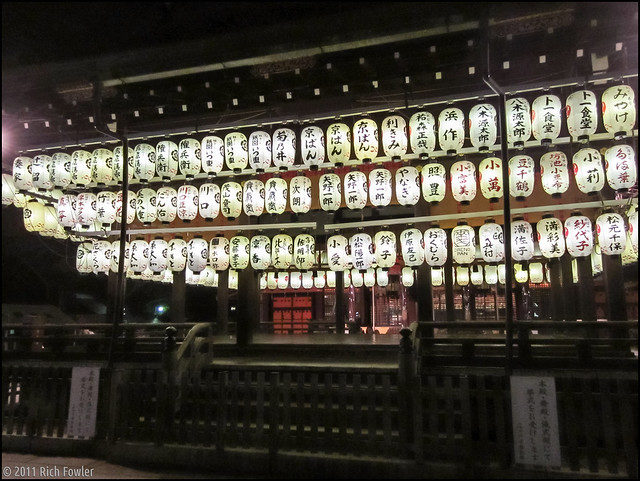
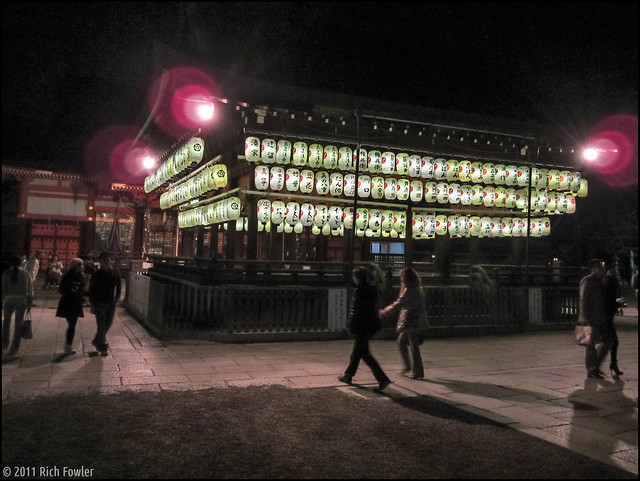
A lantern with some tied up fortune slips (omikuji) to remove the bad luck from bad draws.
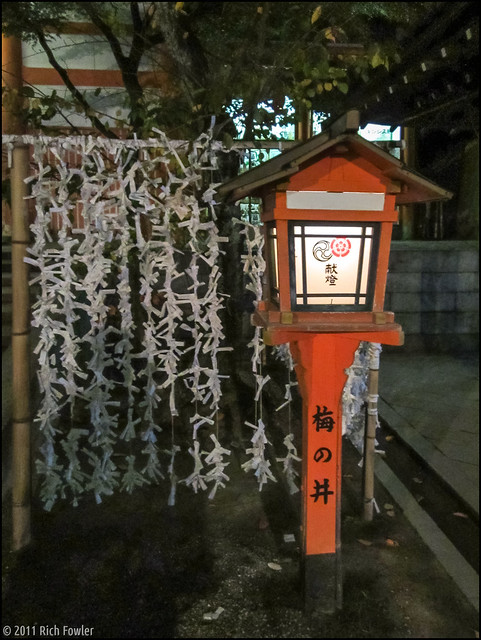
Cool looking vending machine area:

Heading out and back to JR Kyoto Station:

It got to around 7:30, so I decided it was time to head back to the station so I don’t miss my train. It took 45 minutes or so just to get to the station, with all of the changing trains.
At one point, the subway car I was in just stopped at Shiyakushoumae (the station in front of the Kyoto city hall), and said, “That’s it. End of the line.” I needed to go one more stop. Vexing.
But I did get a good shot of the calorie-counting stairs!
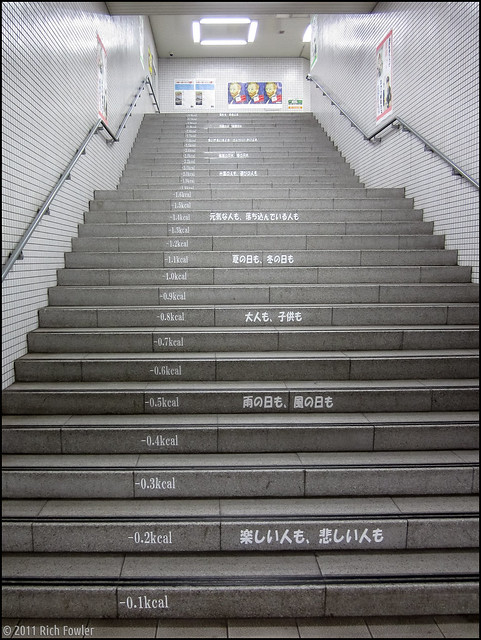
I got back to JR Kyoto at 8:20, and headed to the restroom to freshen up. When I was done, I was in for a rather nasty surprise– there was no TP in the stall! I had to go back to the front of the restroom and buy toilet paper for 100 yen.
The joy of travel. I learn all kinds of new things every time.
I picked up my luggage from the various lockers I had stuffed it in, and made my way to the Shinkansen platform. I had time to kill, so I got an ekiben, which is short of 駅å¼å½“ ãˆãã¹ã‚“ã¨ã† eki bentou, which winds up as ãˆãã¹ã‚“ or ekiben. A bentou is a meal served in a box. Sometimes it’s in a flashy, expensive box, and sometimes it’s just in a plastic box you recycle when you’re done. Ekibens are specialty bentous only sold at certain train stations. Every station has its own specialty.
I got mine, and waited for the train. It showed up, we got on, and then we had to wait 10 minutes for something to get cleared up, because someone somewhere hit an emergency button.
We all got lectured on how we should never do that.
The window seat was a terrible idea. The person in the aisle seat had built a fortress of luggage and crap that made it impossible for me to get to my seat without her having to move it all.
So when we were getting close to Nagoya, I almost killed myself falling over her crap trying to get to mine and get off of the train on time. My jacket got caught on something and everything just tumbled all over the car.
I’m never ever getting a window seat again.
I usually get aisle seats, no matter how long the trip is. I like being able to get out of my seat without too much fuss.
I managed to get off the train in Nagoya without any further incidents, took a moment to get sorted out, headed to platform 2 to catch my train to Okazaki… and promptly missed it by 30 seconds.
I had already used up that å‰ at L.L. Bean, it seems.
Or did I?
I managed to get a good waiting spot (I could lean on a post), and when the train came in, I was first in line, so I got a seat all the way back to Okazaki. Yay.
Don’t put your shinkansen ticket in the local train wicket. When I got to Okazaki, I had to go to the ticket office to get my tickets all sorted out because I did that. Oops.
I grabbed a cab home, and had a nice chat with the cabbie about the four seasons. In Japan, they are firmly convinced that they invented the concept of four distinct seasons, each with its own unique flavor.
Well, it’s interesting to point out that we have four very distinct seasons in the US, even more so depending on where you live, because there’s so much climatological variation here. How we celebrate the various seasons really does depend on where one lives.
In North Carolina, for instance, we have our own leaf-peeper season in fall, too. Just try to get a hotel room in Asheville in mid-October. I dare you. Summer is crazy hot here, spring is wonderful, and winter… well, winter can vary a bit, but it’s generally cold. Not much snow, but we get it. (In 2000, we got over two feet of it where I live.)
I got home, started up the washing machine, and crashed. It was a successful trip in all sorts of ways.
I want to go back to Kyoto and spend some serious time there drinking it all in.
But next time, I think I’ll do it in spring.
